Abstract
In Part 1 of this interview, Marcella F. Fagan recounts her acceptance to Pembroke College in 1940 and her experience as a “day hop” or “city girl.” She describes the effects of World War II, including rations on food and gas, a social life that included few men, the Pratt & Whitney aircraft company’s attempts to recruit student workers, and the activities of the Sewing Club. Fagan relates stories about dating practices at Brown, juggling her studies with paid work, the four-year physical education requirement under professor Bessie Rudd, and posture pictures.
Part 2 of the interview focuses on the 1940s. Fagan describes Pembroke traditions and other aspects of student life, women’s desires for husbands rather than careers, and the importance of community service. She recalls several experiences that made her aware of issues like homosexuality and ethnic and religious divisions, and laments Pembroke’s merger with the Men’s College.
In Part 3, Fagan describes biology class, “senior sisters,” and going to the movies. She compares what she calls “an easier way of life” to the challenges of life in 1988, which include an increased pressure to succeed and the demands made on families with working mothers.
See also: An additional article Washington Was As Far As She Got
Part 1
Part 2
Part 3
Recorded on May 6, 1988 at the John Hay Library, Brown University, Providence, RI
Interviewed by Betsy McKlveen
Suggested Chicago style citation: Marcella F. Fagan, class of 1944 Marcella F.. Interview. By Betsy McKlveen. Pembroke Center Oral History Project, Brown University. May 6, 1988.
Biography
Marcella F. Fagan was born in Providence, Rhode Island in 1923. She graduated from Hope High in 1940 and Brown University in 1944. As a student, she was elected to the War Council and directed Camel Cigarette week, which sent cartons of cigarettes purchased by Pembrokers to troops serving in World War II. Fagan earned her College Teacher Certification from Wheaton College in 1966 and taught in Illinois and Minnesota before returning to Providence in 1986. She was and active volunteer with her church, the Cub Scouts, the Girl Scouts, and the American Cancer Society. At the time of her 1988 interview, she was widowed and the mother of five children. She died on February 23, 1996.
